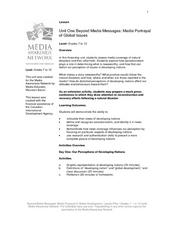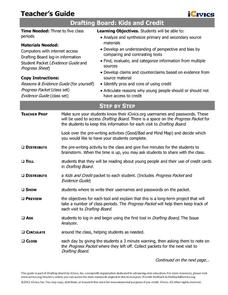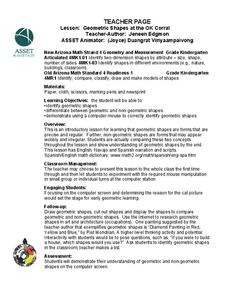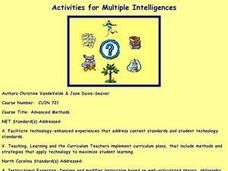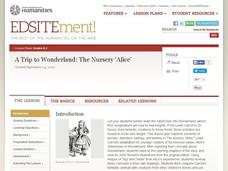National Endowment for the Humanities
The House Un-American Activities Committee
Was the House Un-American Activities Committee justified in investigating subversive influences in the entertainment industry? Part two of the three-part series of lessons that examine the anti-communism movement after World War II,...
Curated OER
Witch Hunt or Red Menace? Anticommunism in Postwar America, 1945-1954
Learners investigate the goals and methods of the House Un-American Activities Committee and offer an opinion regarding whether their investigation of Hollywood was justifiable.
Social Media Toolbox
Reporting with Social Media
What does it take to create news stories that are both informative and objective? Aspiring journalists walk the line between engagement and activism with activity 15 of a 16-part series titled The Social Media Toolbox. Grouped pupils...
National Endowment for the Humanities
Ending the War, 1783
The various peace proposals, made by both sides, to end the Revolutionary War come under scrutiny in this final lesson of a three-part series on the war. Class members read primary source documents and compare them with military...
Curated OER
Beyond Media Messages: Media Portrayal of Global Issues
Take a close look at news reporting techniques and global issues. Begin by creating a graphic representation of developing nations and defining the term. After class discussion, the second day's activities pick up by deconstructing news...
Curated OER
Sense, Sensibility and Sentences: Examining and Writing Memorable Lines
Involve your readers in finding works of literary genius. Have each individual write down compelling sentences that they read or hear, whether in a newspaper, advertisement, book, movie, song, or any other place! Once each person has a...
iCivics
Drafting Board: Kids and Credit
Should kids under the age of 18 be given access to credit cards? Learners identify pros and cons of using credit, develop claims based on evidence, and finally argue reasons for or against credit for minors.
Curated OER
Lights Out on Broadway
How do you write arguments that articulate the views of opposing sides? Through concentrated research, investigation, and critical analysis, leaners become more knowledgable on the opposing argument. The class fills in a KWL graphic...
Curated OER
Rights of the Accused in Search and Seizure
Young scholars explain the rationale behind the Fourth Amendment, and the types of activity regulated by the Constitution. They analyze situations, and explain a citizen's rights when an unlawful search or seizure is conducted.
National Endowment for the Humanities
The War in the North, 1775–1778
Using primary source documents, including maps, learners examine Revolutionary War events from 1775 to 1778. The focus here is on the challenges George Washington and the Continental army faced and how they persevered in spite of those...
National Center for Case Study Teaching in Science
Breast Cancer Risk
How does one determine whether or not someone is at risk for breast cancer? Find out through a comprehensive case study involving two readings and a group activity in which learners assess four women's potential for acquiring the...
Curated OER
Open Your Eyes Wide-Shut
Students improve their language skills through 11 activities. In this language skills lesson, students listen to picture books, answer questions about elements of a story, enhance their vocabulary and grammar skills, use 5 W questions,...
Curated OER
Geometric Shapes at the OK Corral
Students explore geometry by utilizing computer software. In this shape identification lesson, students define several geometric shapes by the characteristics that classify them. Students draw and cut out geometric shapes using their...
Curated OER
Ahimsa and Making Nonviolent Choices with Gandhi and King
Students investigate nonviolent lifestyles by researching the biographies of Martin Luther King Jr and Gandhi. In this peace lesson, students define the term Ahimsa and describe Gandhi's lifestyle. Students identify the six...
National Endowment for the Humanities
Lesson 2: The Debate in Congress on the Sedition Act
Pupils research and discuss the provisions in the Constitution that supported the arguments for and against the Sedition Act. They articulate objections to and arguments in favor of the Sedition Act.
Curated OER
From Formal To Slang
Tenth graders define the term slang, explaining its various social, historical, and racial contexts, so as to articulate when it can be appropriately used as a means of effective communication. They use their own personal slang lexicon,...
Curated OER
Yesterday's World "th" activities
Students read through the text, and discuss the main points. They discuss the commonality of the digraph/th/. Students highligt any text with 'th'word where they see it. They identify the words. Students discuss the different sounds on...
Curated OER
Education: Activities for Multiple Intelligences
Students explore the various types of intelligences and develop strategies to include them in their classrooms. In groups, they research multiple intelligences and create posters about them. Students present their posters to the class...
Curated OER
A Trip to Wonderland: The Nursery "Alice"
Primary learners explore elements of wonder in The Nursery "Alice" by Lewis Carroll. They analyze the plot point after listening to the text. Next, they describe the imagery in various works of children's literature using the given links...
Curated OER
Bring No Poor Articles with You
Students compare their travel needs to homesteaders from the late 1800's in this multi-lesson unit. Students analyze a historic document, explain modes of transportation of the homesteaders, and articulate the personal and economic...
Curated OER
Introduction to Adverbs
Students develop a definition of the role/function of adverbs. Specifically students articulate that adverbs modify verbs by telling how something is done, when something is done, where something is done, or modify adverbs or adjectives.
Curated OER
Filling in the Picture
Students study archaeological sites. They discover some of the problems inherent in choosing sites and what parts are chosen for excavation. They evaluate and explain their choices for study and articulate the process of archaeological...
Curated OER
In Whom Do We Trust?
Young scholars articulate their understanding of the framers' intentions with respect to the separation of church and state, explore the issue of church/state separation and how it is currently manifesting itself in Ohio by reading and...
Curated OER
What Do We Owe To Thoreau?
Students use this design as an electronic reading and writing guide to Henry David Thoreau's famous essay, "On Civil Disobedience." They use activities to familiarize students with the political issues of Thoreau's time. Comprehension...




